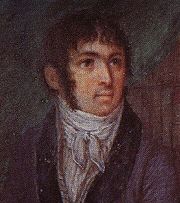
Fabre d'Olivet
Encyclopedia

Hérault
Hérault is a department in the south of France named after the Hérault river.-History:Hérault is one of the original 83 departments created during the French Revolution on 4 March 1790...
– March 25, 1825, Paris
Paris
Paris is the capital and largest city in France, situated on the river Seine, in northern France, at the heart of the Île-de-France region...
) was a French
French people
The French are a nation that share a common French culture and speak the French language as a mother tongue. Historically, the French population are descended from peoples of Celtic, Latin and Germanic origin, and are today a mixture of several ethnic groups...
author, poet and composer whose Biblical and philosophical hermeneutics influenced many occultists, such as Eliphas Lévi
Eliphas Levi
Eliphas Lévi, born Alphonse Louis Constant , was a French occult author and purported magician."Eliphas Lévi," the name under which he published his books, was his attempt to translate or transliterate his given names "Alphonse Louis" into Hebrew although he was not Jewish.His second wife was...
and Gerard Encausse
Gerard Encausse
thumb|Papus in a Martinist Lodge from la [[Belle époque]]Gerard Encausse , whose esoteric pseudonym was Papus, was the Spanish-born French physician, hypnotist, and popularizer of occultism, who founded the modern Martinist Order.- Overview :Gerard Encausse was born at Corunna in Spain on July 13,...
. His best known work today is his research on the Hebrew language
Hebrew language
Hebrew is a Semitic language of the Afroasiatic language family. Culturally, is it considered by Jews and other religious groups as the language of the Jewish people, though other Jewish languages had originated among diaspora Jews, and the Hebrew language is also used by non-Jewish groups, such...
, Pythagoras
Pythagoras
Pythagoras of Samos was an Ionian Greek philosopher, mathematician, and founder of the religious movement called Pythagoreanism. Most of the information about Pythagoras was written down centuries after he lived, so very little reliable information is known about him...
's thirty-six Golden Verses and the sacred art of music
Music
Music is an art form whose medium is sound and silence. Its common elements are pitch , rhythm , dynamics, and the sonic qualities of timbre and texture...
. His interest in Pythagoras
Pythagoras
Pythagoras of Samos was an Ionian Greek philosopher, mathematician, and founder of the religious movement called Pythagoreanism. Most of the information about Pythagoras was written down centuries after he lived, so very little reliable information is known about him...
and the resulting works started a revival of Neo-Pythagoreanism that would later influence many occultists and new age spirtitualists. He attempted an alternate interpretation of Genesis, based on what he considered to be connections between the Hebrew alphabet and Hieroglyphs. The discovery of the rosetta stone and the subsequent understanding of Egyptian Hieroglyphs that followed would prove much of this particular work technically mistaken. He was declared a non-person by Napoleon I
Napoleon I of France
Napoleon Bonaparte was a French military and political leader during the latter stages of the French Revolution.As Napoleon I, he was Emperor of the French from 1804 to 1815...
and condemned by the Pope.
An interesting story involves his healing a deaf boy of his hearing impairment, and then having Napoleon officially declare that he is never again to heal another person of deafness. He indicates that he kept the letter of notice out of amusement. Outside of esotericism
Esotericism
Esotericism or Esoterism signifies the holding of esoteric opinions or beliefs, that is, ideas preserved or understood by a small group or those specially initiated, or of rare or unusual interest. The term derives from the Greek , a compound of : "within", thus "pertaining to the more inward",...
, he also invented the poetic measure
Meter (poetry)
In poetry, metre is the basic rhythmic structure of a verse or lines in verse. Many traditional verse forms prescribe a specific verse metre, or a certain set of metres alternating in a particular order. The study of metres and forms of versification is known as prosody...
of eumolpique. He had an argument with Lord Byron over the British poet's publishing of a play, "Cain", which questioned a Christian view of Genesis. d'Olivet believed the play would destroy Christian beliefs and undermine the spirit of the English people at the very time they needed some faith to endure a very difficult life. Byron's response went something like, "I'm only a poet; I don't know anything about these philosophical concerns of yours!" The play was very popular in England.

